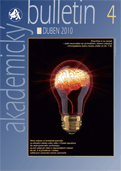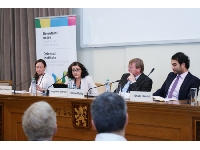On Wednesday, 16 September, the Oriental Institute of the CAS organized an international conference entitled Democracy in the Political Culture of the Middle East, Asia, and Russia. “One of the questions which we want to answer is whether education can support democracy,” stated Director of the Oriental Institute of the CAS Mgr. Ondřej Beránek, Ph.D. A number of important foreign guests appeared at the conference, including for instance Shadi Hamid (The Brookings Institution), Naghmeh Sohrabi (Brandeis University) and Thomas Ruttig (Afghanistan Analysts Network). The presenters devoted themselves primarily to the situation in Egypt, Turkey, Iran and Afghanistan but also in Uzbekistan, China and Russia. The conference took place within the Strategy of the CAS for the 21st Century and the conference Forum 2000.
Shadi Hamid immediately in the introduction mentioned that if the Muslim states existed in an
isolated world, they would not direct their political system towards democracy, but they are pushed
to that by the circumstances in the real world. “In the case of Egypt, it is the result of
something that can be labelled as illiberal democracy,” stated and added that the Islamic movement
or political parties in Egypt see the state as a means to the Islamization of society. A weaker,
decentralized states would hence mean less battles for power. Iran was dealt with by Naghmeh
Sohrabi who explained in her paper that the elections there are free but not fair. Despite that,
she sees a shift in that today’s Iranians know that they vote only within certain very limited
boundaries, but they understand that their vote is respected within these limits.
The situation in Afghanistan was commented on by Thomas Ruttig, who explained that the war is
not at an end by far in this country and that almost half the people there live under the poverty
line, hence people there have other worries than politics. In his paper, he then indirectly
answered the question of Ondřej Beránek mentioned in the introduction. “The young generation of
Afghanis is so far the best educated, despite that it has become anti-Western and anti-democratic.
And it is among people who do not support the Taliban. It is paradoxically the consequence of
Western investment in education.” According to Ruttig, democracy should not be brought to these
countries such that we force our system on them, but that we create the milieu there for democratic
values.
“From my point of view, we have been too quick in drawing the conclusion that democracy cannot
work in these countries,” said the organizer of the conference, PhDr. Věra Exnerová, Ph.D., from
the Oriental Institute of the CAS, more optimistically at the end of her paper.
Prepared by: Department of Media Communications of the Head Office of the CAS
Photo: Stanislava Kyselová (Akademický bulletin)
5 Oct 2015








